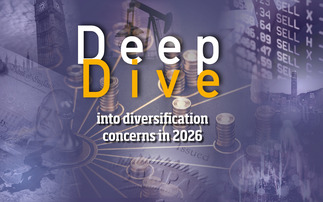Industry Voice: Richard Colwell, Head of UK Equities at Columbia Threadneedle Investments, says UK firms which are busy making contingency plans and not waiting for clarity from politicians could prosper, and that going into 2019 there are many undervalued opportunities.
Reflecting on 2018, global equity markets have lurched from optimism to pessimism. At the beginning of the year there was a complacent belief in synchronised global growth. But cut to the fourth quarter and many strategists are speculating whether the United States might soon enter a recession and how Chinese economic growth is slowing as they try to get a grip of their own excessive debt levels. A year ago, only a Brexit-induced UK recession was feared, but now people are cautious about the US economy, China and others besides.
So while investors are becoming more cautious, the good thing is that there is no "hot money" in UK equities. Global funds have been very negative on the asset class ahead of an unpredictable exit from the European Union and a possible neo-socialist Labour government. Instead, asset allocators have been overweight the perceived safe havens of the US, Europe or Japan - from which they are now retreating.
To quote former US Secretary of Defense Donald Rumsfeld, the UK is a "known unknown". The rest of the world is an "unknown unknown" though, which in the eyes of Rumsfeld would make it a far more worrisome prospect.
In this context, UK equity valuations look cheap on many metrics. Price-to-book ratios, for example, are at a lower level relative to US equities than the extreme level they reached in 1999 at the peak of the ecommerce bubble. While the performance of UK equities cannot entirely escape correlation against other markets, we would hope that the relative valuation of UK companies should allow them to be more resilient if there is further turbulence.
Warning tremors signal further volatility
After a decade of easy monetary policy driving a bull market, it is hardly surprising that volatility has risen as this financial liquidity has been withdrawn. For over a year now the US Federal Reserve has been moving from quantitative easing to quantitative tightening, at the same time as short-dated rates have been rising. Yet long-term forecasters largely failed to predict that greater volatility was well overdue everywhere in 2018. The first flare up, in February, was an important marker.
Then the second and more significant tremor happened in October, as the Fed reset expectations for rate hikes, indicating that they could rise above 3%.
This change in discount rate being applied to highly-rated growth stocks, such as the "FAANG" tech stocks meant that their share prices pulled back from very high levels. That was rational, overdue and healthy.
But the market also started to ask when will the US economic cycle end?
To be fair, there is early evidence of slowing revenue growth and cost pressures in some industries that are sensitive to the economic cycle, like car manufacturers and semi-conductor companies. The market always discounts the future. But the huge growth of Exchange-Traded Funds (ETFs) and other quantitative funds, many of which tend to follow momentum, means that topics the market might previously have processed over six months get translated in warp speed. For example, with this recent pessimism quant funds have significantly marked down all industrial stocks, which seems premature.
2019's undervalued opportunities
Looking to 2019, the market seems to be moving away from an era when momentum-fuelled growth stocks led indices higher, an environment characterised by a focus on news flow with the "buying of bullies and selling of victims". Instead, there is now some well overdue evidence of rotation into value stocks. The UK offers a range of opportunities. We have been adding to businesses that the market has become nervous about, either due to Brexit or perceived structural threats due to disruption etc. We are asking whether in the fog of emotion, the market has punished a share price without appreciating the resilience of the business or their ability to adapt.
A lot of global firms that are listed in the UK but operate internationally are trading on significantly cheaper valuations than their peers listed elsewhere. This reflects the weight of money that has been taken out of the UK due to political and economic uncertainty over Brexit. Nevertheless, the resulting valuation arbitrage has led to shareholder activism reaching record levels. Merger and acquisition activity is also likely to continue at a faster pace as foreign companies take advantage of these cheap valuations.
We want to be investing in company managements with a "can do" attitude, who have been making Brexit contingency plans since the referendum, knowing that waiting for clarity from the politicians is dangerous! They have been building up inventory, adapting their logistics networks, and protecting against skill shortages. While these preparations may have required extra investment, we believe that this should allow businesses to continue to operate, whereas valuations are often pricing in a far more pessimistic outlook.
Timing
The best time to invest is when it feels uncomfortable. The opportunity cost of investing in the UK rather than elsewhere is very different now that markets have worked out that there are issues elsewhere in the world. Brexit is no longer the only risk factor. Now is the time to focus on valuation not just news flow.
International investors are almost as underweight UK equities as they were during the financial crisis of 2008/2009 when the banks were technically insolvent. There is an opportunity to buy under-valued UK stocks. We think that the UK is in some ways like the new Japan, in as much as it is less correlated with other equity markets. We don't have a strong view on Brexit. Our edge lies in selecting the best stocks based on the company's fundamentals; not reviewing the comments of politicians.
To find out more visit columbiathreadneedle.com
Important information: For investment professionals only, not to be relied upon by private investors. Past performance is not a guide to future performance. The value of investments and any income is not guaranteed and can go down as well as up and may be affected by exchange rate fluctuations. This means that an investor may not get back the amount invested. This material is for information only and does not constitute an offer or solicitation of an order to buy or sell any securities or other financial instruments, or to provide investment advice or services. The analysis included in this document has been produced by Columbia Threadneedle Investments for its own investment management activities, may have been acted upon prior to publication and is made available here incidentally. Any opinions expressed are made as at the date of publication but are subject to change without notice and should not be seen as investment advice. Information obtained from external sources is believed to be reliable but its accuracy or completeness cannot be guaranteed. This material includes forward-looking statements, including projections of future economic and financial conditions. None of Columbia Threadneedle Investments, its directors, officers or employees make any representation, warranty, guarantee or other assurance that any of these forward looking statements will prove to be accurate. Issued by Threadneedle Asset Management Limited (TAML). Registered in England and Wales, Registered No. 573204, Cannon Place, 78 Cannon Street, London EC4N 6AG, United Kingdom. Authorised and regulated in the UK by the Financial Conduct Authority. Columbia Threadneedle Investments is the global brand name of the Columbia and Threadneedle group of companies













